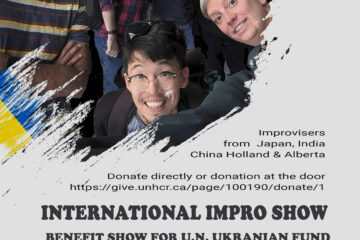THOUGHTS, IDEAS, QUESTIONS, PROCESS, LESSONS,
Student Post
FUCK POLITE
OSHOW – Week 2
ENGLISH TRANSLATION BELOW JAPANESE ORIGINAL––
2週目 こっちの生活にもだいぶ慣れてきた。というか、この季節は日本よりもこっちで過ごす方が快適だ。毎日気候が安定してるし、気温は25度前後、カラッとした気候で過ごしやすい。外でクラスをやることも多いのだが、この気候だったらそれも納得だ。
月曜はスーパーの下にある大部屋でクラスを行った。スーパーの会員だったらその施設を使えるらしい。こういう便利な仕組みが日本にも増えて欲しい。
この日は何人かのルースムースのプレイヤーが参加し、その中にはかつて日本にも来たことのあるカティ・シュバイツァーもいた。当たり前のことかもしれないが、カティのような経験豊富なインプロバイザーでもクラスを受けてフィードバックをもらえるような環境があることを羨ましく思った。
日本はまだインプロ歴史が浅い(30年ほどしかない)から10年程度キャリアを得るとベテランのような扱いをされる。そしてなおかつ第一線でパフォーマンスをし続けている20年、30年プレイヤーが少ないため、中堅のプレイヤーが学ぶ場、憧れられるプレイヤーがいないというのが現状だ。
海外では30年プレイヤーでもまだまだ現役で活動しており、むしろインプロをさらに探求しチャレンジをし続けていると言う印象だ。日本だと経験を積めば積むほど指導することだけに安住してしまう人が多い。むしろ若い人たちの方がいろんなチャレンジをしているような印象だ。僕の役割は、こういった海外での経験を日本でシェアしたり、海外のインプロバイザーを日本に招いたりして、少しでも日本のインプロのパフォーマンスのクオリティーを上げていくことだ。
火曜は生徒同士で指導し合うクラスとなった。今回のスクールには、指導もやっている人が多いので、それぞれの知見をシェアしたり、フィードバックをし合う事はとても有益だ。次の日の水曜には、ショーンからのフィードバックがあった。ショーンのフィードバックはとても細かく、言葉の使い方、声のトーン、体の癖など、指導している内容そのものよりも指導者としてのあり方を伝えてくれた。ちなみに僕はクラウンの指導をして、割と褒められた。ただ英語と日本語ではどうしても言語的違いがあるので、英語だと少し硬くなってしまったが「わからないまましゃべりだしてしまって、わからないことを生徒に聞きながら指導を進める」と言うアドバイスはとても役に立った。インプロでも同じことが言えるかもしれない。
2週間過ごして1番自分に感じている変化は、今まで英語でインプロをするときは「なるべく言葉を間違わないようにしよう」「正しく伝えるようにしよう」と言う意識が大きかったに思えるが、最近は「わかんないものはわかんないからしょうがねえ!」と開き直り、むしろスピリッツで楽しむようになっている。間違えることに対して前向きになっているし、自分のクラウンステイツも生かされている気がする。これは日本に帰ってからもそうでありたい。
水曜の夜にはkinkonautsのショーに行った。kinkonautsとは、カルガリーにある若いインプロチームで、何人かはルースムースのショーにも参加している。自分もゲストとして出演することになり、なんだかんだでカルガリーに来てはじめてのインプロショーだったので、どんなものか楽しみにしていたのだが、結果は散々なものだった。典型的な見せかけの熱狂によるショーで、ホストプレイヤーの4人は実質的には皆ステージを恐れているような気がしていた。その証拠に、体は後に傾き、腕や手を体の前で組んでいた。恐れや不安のあるビヘイビアだ。そこにホストのMCが4人を「スタープレイヤー」として紹介したことで、4人のエゴは更に刺激されてしまったと思う。
ショーの内容は「Bucket show」というもので、プレイヤーの名前をバケツに入れ、MCが何人かを中からピックアップし、その人たちとスタープレーヤーでシーンを作っていくと言うものだ。ほとんどの参加者は初心者だったので、彼ら彼女らについてのコメントは控えるが、問題はホストである。まずスタープレイヤーの動きがあまり良くなかった。本来であれば初心者をサポートするように動けばいいと思うのだが、そもそもそこまでのキャリアがないようにも思えた。相手から影響受けたり、相手とつながったり、リスクを被ったり、ストーリーを前に進めたり、基本的な技術がまだ十分に固まっていなかった。おまけにシーンのエンディングをコントロールしていたMCやtechが、全体的にシーンを終わらせるのが遅かった。もうすでにプレイヤーは困っていたり、シーンが死にかけているのに、長く続けるのは誰にとってもよくない。
全体的にショーのホストが責任を果たせていないような気がした。クラスのメンバーは何とか相手とつながったり、ストーリーを前に進めようと奮闘していたが、他の人がそうではない状態だったので、なかなか大変なショーとなった。彼ら彼女らがこの上をどのように振り返ったのか気になる。これを楽しかった、面白かったで終わらせたのだとしたら、そもそも方向性を見誤っているような気がする。
救いとなっているのは、MCのエレンやスタープレイヤー、あまりこの呼び方好きじゃないが、の何人かはルースムースにインプロを学びに来ているということだ。若くて勢いのあるチームと、老舗で技術のあるチームとの交流が盛んに行われているのは日本も見習うべきポイントだ。
日本では、上の世代の仲が悪く、謎に派閥が生まれている。インプロを長く学んでいるのにもかかわらず、ほんとに恥ずかしいことだ。。。
気を取り直して木曜日。前日のショーを振り返り、ショーで行われたいくつかのゲームをショーンの指導のもとやり直してみると言う会だった。ワンワード、ワンボイス、次どうなるの?などの典型的なキースのゲームをいくつか扱った。キースの1番の理解者の1人であるショーンから、改めてキースのゲームを教えてもらうのは非常に有意義だった。
特にワンボイスはようやくやる意味がわかった気がする。よくあるワンボイスは、お互いに空気を読み合い(日本人これ好きだが)一緒にしゃべるといったものだったが、相手と本当に繋がれるために戦う言うスタンスは今までみてきたワンボイスと間逆のようだった。だが、圧倒的にこっちの方が面白い!キースがインプロで大事にしていたのは、本当に人と人がつながり合うことであり、人間の本質をつくようなものだったのだと改めて思った。見せかけの熱狂はもうたくさんだ。
そんな経験を経て、土曜日のルースムースシアターの上を観劇した。この日はとっても奇妙な夜だった。観客に若い中高生たちが多かったことで、シーンの点数が偏ったのだ。多くのシーンが4点5点を連発し、中にはくだらないシーンがたくさん入ってた。ルースムースのメンバーはこれが異様なことだと理解しているが、そうでなければこれは危険なことだと思う。観客の笑いに影響され、くだらないシーンを連発してしまうようなプレイヤーが育つ可能性もあるからだ。実際、このショーの中でも、観客の好みに影響されて、殺人のシーンがたくさん行われた。理解のあるプレイヤーでもこういうことが起こり得るのど。
僕は観客を教育していくこともインプロバイザーの役割の1つだと思う。例えば観客にやたらとアイディアを聞くのはあまり良いとは思えない。単純にショーの進行が遅くなってしまうし、望まないシーンを演じることになってしまうからだ。チャレンジのためだったり、ショーにバラエティーを持たせるためだったら聞いてもいいかもしれないが、ショーの主導権を観客に与えないほうがいいと思ってる。
日本では「お客様は神様」と言う有名な標語があり、もうこれは死語になりつつはあるが、どことなくカスタマーファーストで、お客さんという存在を尊重しすぎる節がある。そして多くのインプロショーで、それを感じる。プレイヤーは基本的に礼儀正しく、good nature でいるのだが、どこが観客に対して一歩ひいているように見える。
最近亡くなった日本の伝説的コメディアン上岡龍太郎も「日本人は断定的にものを言わんから人を惹きつける力がない」と言っていた。まさにそれが現代のインプロシーンでも起こっている気がする。
ブッフォンの必要性に関してショーンとも話したのだが、特に日本人はブッフォンの持つ「fuck polite」が必要な気もする。話しながら気づいたのだが、日本のインプロバイザーは(というかほとんどの表現者がそうかもしれない)お客さんに対して敬語を使うのが当たり前になってる。僕はそれも原因の1つじゃないかなと思っている。
そういうところから変えていくことで、お客さんとのつながりはもっと強くなっていくのかもしれない。
————
ENGLISH TRANSLATION
Week 2
I’m getting used to life here. Or rather, it’s more comfortable to spend this season here than in Japan. The weather is stable every day, and the temperature is around 25 degrees, making it easy to spend.
I often hold attend outside, but in this climate it makes sense. On Mondays, the class was held in a large room under the supermarket. If you are a member of the supermarket, you can use the facility. I would like to see more convenient systems like this in Japan.
There were several Loose Moose players on the day, including Kati Schweitzer, who had been to Japan before. It may sound obvious, but I was envious of an environment where even experienced improvisers like Kati could take classes and receive feedback.
Japan still has a short history of improv (only about 30 years), so if you have a career of about 10 years, you will be treated like a veteran. And yet, there are few players who have been performing on the improv show for 20 or 30 years, so there is no place for more than 10 years career players to learn and no players to look up to.
Overseas, even though they have been players for 30 years, they are still active. In Japan, the more experience one has, the more people tend to settle for just teaching. Rather, I get the impression that young people are taking on various challenges. My role is to share these overseas experiences in Japan, invite overseas improvisers to Japan, and raise the quality of improv performances in Japan as much as possible.
Tuesday was a class where students teach each other. At this school, there are many people who are also teaching, so it is very beneficial to share each other’s knowledge and give feedback.
The next day, Wednesday, we had feedback from Shawn. His feedback was very detailed, and he told me how to teach rather than what to teach, such as the use of words, tone of voice, and body habits. (By the way, I coached clown and got a lot of compliments.) However, since there is always a linguistic difference between English and Japanese, I felt a little stiff when using English, but his advice was very useful, saying, “If you start talking without understanding, you can ask the students what they don’t understand while teaching.” The same could be said for improv.
The biggest change I’ve felt in myself after two weeks is that when improvising in English. I used to be more conscious of “trying not to make mistakes in words” and “trying to do correctly”. Recently, I have become defiant, saying, “I don’t know what I don’t know, so it can’t be helped!”
I’m more positive about making mistakes, and I feel like my clown state is being put to good use. I want this to continue even after I return to Japan.
I Went to the Kinkonauts show on Wednesday night. Kinkonauts are a young improv team in Calgary, some of whom have also been on the Loose Moose show. It was my first improv show since I came to Calgary, so I was looking forward to seeing what it would be like, but the results were disappointing.
It was a show of typical pretense frenzy, and all four of the host players seemed practically terrified of the stage. The proof was that the body was leaning back, and the arms and hands were folded in front of the body. It’s a fearful or anxious behavior.
I think that the host MC introduced the four as “star players”, which further stimulated the ego of the four.
The content of the show is called a “Bucket show”, where players’ names are put in a bucket, the MC picks up some of them, and they and the star players create a scene. Most of the participants were beginners, so I will refrain from commenting on them, but the problem is the hosts.
First, the movement of the star player was not so good. Originally, I think that it would be good to move to support beginners, but it seemed that there was no career to that extent in the first place. The basic skills of being influenced by others, connecting with them, taking risks, moving the story forward, etc., were not yet solidified. On top of that, the MC and tech who controlled the ending of the scene were slow to finish the scene. It’s not good for anyone to go on too long when players are already in trouble or the scene is dying. Overall, I felt like the host of the show was failing their responsibilities. Shawn’s class members were struggling to connect with partner and move the story forward, but it was a tough show because the others weren’t.
I wonder how they looked back on this. If this was fun, interesting and ended, I feel like they’re looking at the wrong direction in the first place. The saving grace is that MC and director Ellen and some of the star players, I don’t really like that term, come to Loose Moose to learn to improv.
It is a point that Japan should learn from the active interaction between young energetic teams and long-established teams with skills. In Japan, the older generation is on bad terms, and some factions are emerging. It’s really embarrassing, even though they’ve been learning improv for a long time. . .
Thursday, It was a meeting to look back on the previous day’s show and try to redo some of the games that were played at the show under Shawn’s guidance. Word at a time, One voice, What comes next?…
We dealt with some typical Keith games such as It was very meaningful to learn Keith’s game again from Shawn, who is one of Keith’s number one understandings. In particular, I feel like I finally understood the meaning of doing One voice.
Common One voice were about reading each other’s moods (Japanese people like this) and talking together slowly, but the stance of fighting to really connect with the other person seemed to be the opposite of the One voice I’ve seen so far. . However, this one is overwhelmingly more interesting!
What Keith really valued in his improv was the connection between people, and I thought again that it was something that touched on the essence of human beings. Enough of the feigned frenzy.
After that experience, I went to see a show on Saturday at the Loose Moose Theater. It was a very strange night. The score of the scene was biased because there were many young junior high and high school students in the audience. A lot of the scenes were 4-5 in a row, and there were a lot of silly scenes inside. The members of Loose Moose know this is bizarre, but otherwise I think it’s dangerous. This is because there is a possibility that players will grow up to be influenced by the audience’s laughter and repeat silly scenes. In fact, even in this show, there were many scenes of murder, influenced by the taste of the audience. This can happen even to an understanding player.
I think one of the roles of the improviser is to educate the audience. For example, I don’t think it’s a good idea to ask the audience for many ideas. It simply slows down the show and ends up performing scenes you don’t want. If it’s for a challenge or to add variety to the show, I might ask, but I think it’s better not to let the audience control the show.
In Japan, there is a famous slogan, “Customer is God”, and although this is becoming a dead phrase, that places too much respect on the existence of the customer, putting the customer first. And I can feel it in a lot of improv shows. The players are basically polite and have a good nature, but it seems that they are one step back against the audience.
The recently deceased legendary Japanese comedian Ryutaro Kamioka once said, “Japanese people don’t have the power to attract people because they don’t speak assertively.”
I feel like that’s exactly what’s happening in the modern improv scene. I also talked with Shawn about the necessity of Bouffon, (CLOWN STYLE) and I feel that Japanese people especially need Buffon’s “Fuck polite”. While talking, I noticed that Japanese improvisers (or rather, most expressive people probably do) use honorifics with the audience. I think that’s one of the reasons. By changing from that point, the connection with the audience may become stronger.




0 Comments